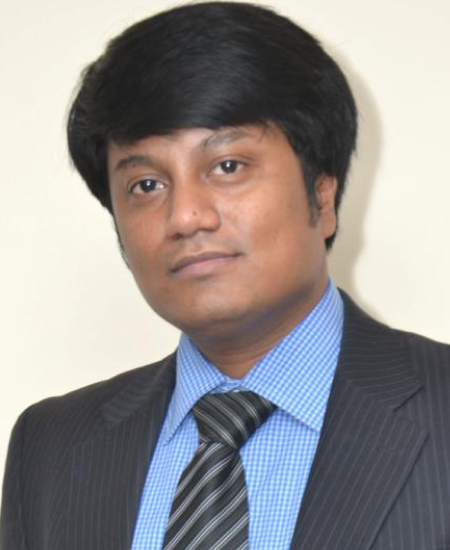NBS-NewBorn Screening
What is NBS?
Newborn screening is a simple test performed 48 hrs. after birth that enables early detection of serious and life-threatening conditions which may lead to mental/physical retardation or early death, thereby preventing adverse health outcomes and helping the baby lead a normal healthy life.
The affected baby looks healthy at birth but may be born with a serious medical condition called Inborn errors of Metabolism (IEM) which cannot be diagnosed until specifically tested for. If not tested and treated right after birth, it can lead to irreversible damage.
Early & accurate diagnosis of these disorders is very important in determining outcome, and hence New born genetic screening is recommended by medical councils across the world and NBS is now compulsory (Paid for by Government) in more than 50 countries across the globe.
For its contribution to the child health NBS program has been voted as one of the TOP TEN Great Public Health Achievements in USA in the last decade. It has saved lives of millions of babies across the world and helped them live a normal life.
Benefits of NBS
The biggest benefit of NBS is early detection of the disorders and prevention of untoward outcomes with early intervention. Early detection allows early treatment which usually involves a change in diet or medication that can help the baby live a normal life.
Highest Testing sensitivity: Disorder detection rate is 95%. (The highest in its class).
Since these metabolic disorders are not apparent at birth, it’s impossible to suspect and diagnose these disorders until they are specifically tested for through NBS.
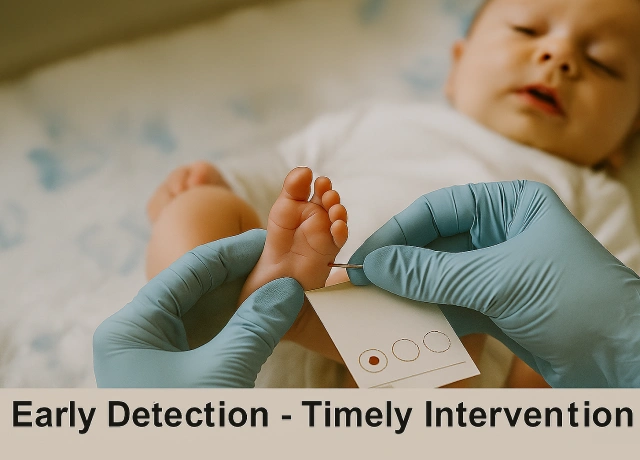
Some of the conditions that can be diagnosed in advance and prevented are:
- Neurological abnormalities, Mental Retardation.
- Developmental delays and Physical Abnormalities.
- Learning difficulties, Language and Speech difficulties.
Why every baby needs this test?
Newborn Screening (NBS) is a simple yet extremely important test, performed soon after birth to identify harmful and potentially serious but treatable medical conditions in a newborn baby. The affected baby may look healthy at birth as there is no external physical defect, and hence difficult for the patient or even the doctor to identify. If not detected and treated right after birth, these conditions may lead to irreversible physical and mental disabilities and a whole lot of complications affecting the child’s quality of life in years to come.
Such as:
- Irreversible mental retardation
- Developmental delays
- Learning difficulties
- Speech problems
- Organ damage
- Sudden death in some cases
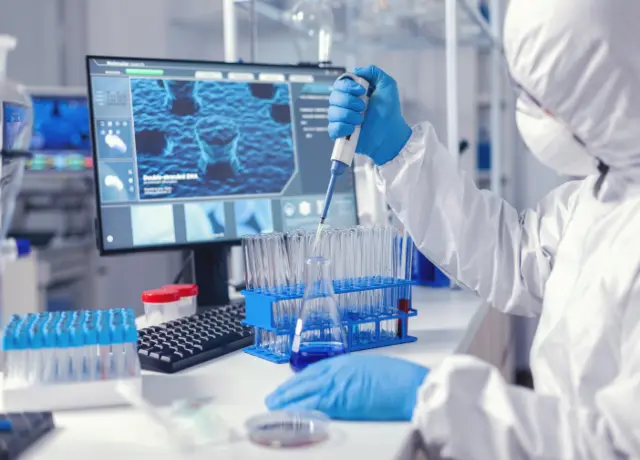
Today, many such serious medical conditions can be identified through New Born Screening (NBS) as early as the 3rd day of life, before they cause irreversible harm to the baby.
Early detection helps parents and doctors, take simple precautionary measures like diet modifications, special infant formula feed, or medication in some cases to prevent serious adverse health outcomes and help the baby live a healthy life.
Newborn screening over the years has saved millions of new born babies and is now mandatory in more than 50 + countries, and is strongly, recommended by pediatric associations across the world including India.
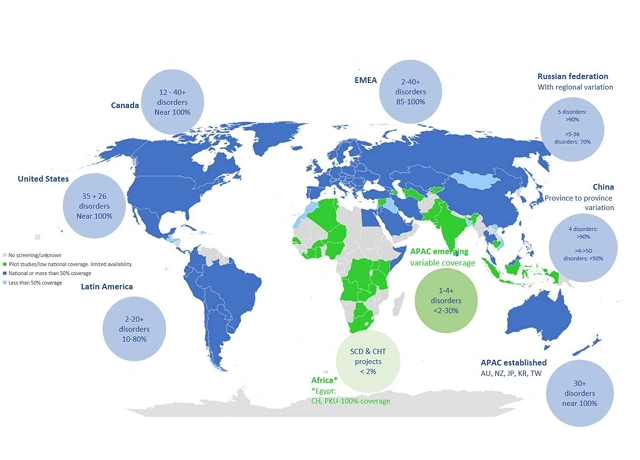
Today, many such serious medical conditions can be identified through New Born Screening (NBS) as early as the 3rd day of life, before they cause irreversible harm to the baby.
Early detection helps parents and doctors, take simple precautionary measures like diet modifications, special infant formula feed, or medication in some cases to prevent serious adverse health outcomes and help the baby live a healthy life.
Newborn screening over the years has saved millions of new born babies and is now mandatory in more than 50 + countries, and is strongly, recommended by pediatric associations across the world including India.
Why choose Navigene NBS?
Tailored Packages for Your Baby
Choose from a protection against basic 7 condition to a comprehensive 110+ critical condition screen–based on your baby’s needs and your doctor’s advice.
Simple, Safe & Non-Invasive
Only a few drops of blood (through heel prick) or a small urine (on a special card) are needed.
Advanced International Technology
We use the latest tools like Mass Spectrometry, trusted by doctors around the world for accurate results.
Clear, Easy-to-Understand Reports
Full Support If Needed
How the NBS Test is performed?
Step 1 : Register
Register for Navigene Baby Screen and select the package you want for your baby in consultation with your doctor or Navigene Experts.
Sampling
Based on the package selected, collect the Urine and/or Blood sample on the special collection kits provided at time of registration and send it to Navigene or call us for a pickup (A Navigene partner hospital will do this for you.
Results
Navigene will send a comprehensive and easily interpretable report within 1-2 days followed by any assistance as required.
How sample is collected/ Sample collection procedure
Navigene’s Newborn Screening test involves a simple and non-invasive process for sample collection. Based on the package chosen, either a urine sample or a few drops of blood, or both, need to be collected on special filter papers provided in the kit.
The Collection Process:
Special sample collection kits with filter paper are provided by Navigene.
The sample has to be collected only after 48 hours of birth and only after 24 hours of first feed. Newborn Screening (NBS) can be performed as early as the 3rd day of life. While the test is typically done 24 to 72 hours after birth, there is no age limit for the BabySecure Newborn Screening test; sooner is better, but it can still be done if the initial window is missed.
For blood collection, a trained staff will take a few drops of blood from the baby's heel. The test is performed by a simple prick on the baby's heel and collecting a few drops of blood on a special filter paper card. The heel prick does not cause any harm to your baby. A fresh disposable specialized needle called a 'Lancet' is used for every baby, ensuring no chance of your baby getting any infection.
For urine collection, 10-15 ml urine is soaked onto a special filter paper.
Once collected, send the sample to Navigene or call us for a pickup. A Navigene partner hospital will also do this for you.
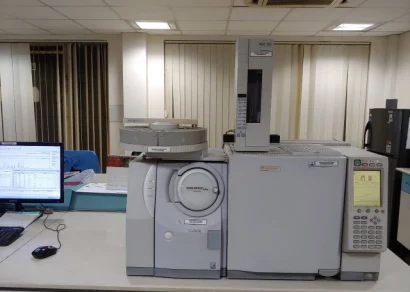
Our Advanced Technology: At Navigene, these tests are based on state-of-the-art, highly accurate technologies of Gas Chromatography Mass Spectrometry (GC-MS) and Tandem Mass Spectrometry (MS-MS). These are considered cutting-edge technologies in newborn screening internationally.
Conditions screened
| Condition | Adverse Effects | Treatment / Management |
|---|---|---|
| Congenital Hypothyroidism (CH): CH is a lack of thyroid hormones present from birth. Infants are usually clinically normal at birth, due to the presence of maternal thyroid hormones. | Mental retardation, Hearing loss, Stunted growth, Speech delay, and behavior problems. Damage to the brain and nerves is usually permanent and cannot be reversed. | Supplemented with thyroxine which is easy, inexpensive, and very safe. |
| Galactosemia: Inability to digest Galactose, a simple sugar found in breast milk, many infant formulas, and milk products. | This condition can harm the baby’s eyes; can cause serious liver and brain damage and even death. | A special milk-free diet as soon as the condition is found can prevent problems. |
| Biotinidase Deficiency: Lack of an enzyme called biotinidase. | Seizures, developmental delays, eczema, and hearing loss. | Oral supplementation of BIOTIN (sometimes called vitamin B7). |
Our NBS test panels / NBS customizable packages
| Test | Disorders Covered | Sample Required | Technology Used |
|---|---|---|---|
| NBS – 3 | Congenital Hypothyroidism, Congenital Adrenal Hyperplasia & G6PD deficiency | Dried Blood Spot | Biochemistry & ELISA |
| NBS – 4 | NBS 3 + Cystic Fibrosis | Dried Blood Spot | |
| NBS – 6 | NBS 3 + Galactosemia, Biotinidase & Phenylketonuria (PKU) | Dried Blood Spot | |
| NBS – 7 | NBS 4 + Galactosemia, Biotinidase & Phenylketonuria (PKU) | Dried Blood Spot | |
| NBS 50 |
Covers 50 Disorders (excluding those in NBS 6) 1. Amino Acid profile 2. Acylcarnitine Profile |
Dried Blood Spot | MS-MS (Tandem Mass Spectrometry) |
| NBS 110 |
Most comprehensive package covering 110 disorders: 1. Organic Acidemia 2. Fatty Acid Oxidation Disorders 3. Amino Acid Disorders 4. Sugar Metabolism Defects 5. Purine, Pyrimidine Disorders 6. Peroxisomal Disorders |
Urine Sample on special filter paper | GC-MS |
| NBS 31 | Covers 31 most common and critical disorders affecting neonates (a subset of NBS 110) | ||
| NBS 110 + 3 | Tests for disorders in NBS 110 + NBS 3 | Urine Sample & Dried Blood Spot (Non-invasive) | GC-MS & Biochemical Analysis |
| NBS 31 + 3 | Tests for disorders in NBS 31 + NBS 3 | Urine Sample & Dried Blood Spot (Non-invasive) | GC-MS & Biochemical Analysis |
Our technology
The tests are based on state-of-the-art, highly accurate technologies of Gas Chromatography Mass Spectrometry (GC-MS) and Tandem Mass Spectrometry (MS-MS) considered to be cutting edge technologies in new born screening internationally.
Your report / Post screening support
Navigene will send a comprehensive and easily interpretable report within 1-2 days followed by any assistance as required. Both e-copy and a physical copy are provided.
Important Note: Sample has to be collected only after 48 hours of birth and only after 24 hours of first feed.
In case a baby is tested positive for any of the conditions, Navigene apprises the parents and the doctor about the result and follow up investigations if needed. Navigene can also arrange a consultation with Genetic Metabolic Experts for further treatment/therapy recommendation. Navigene also provides requisite Genetic Counselling to the family.
Trusted Partner for NBS
1. Navigene is one of the pioneers in the NBS space in India with 30+ years of combined experience in the New Born Screening space, has detected several cases of these disorders thereby saving new borns from future problems.
2. Navigene is now trusted by all major hospitals, clinics, nursing homes, IVF centers and birthing centers in India, as well as by international clients.
3. Navigene is an NABL accredited (Mc, 25488) laboratory and has also successfully passed several international-quality assurance programs.
NBS Myth Buster
1 Myth
My baby looks healthy, so they don't need screening.
Fact
Most infants with these conditions show no sign of illness immediately after birth.
2 Myth
Newborn screening can cure genetic disorders.
Fact
Your baby cannot be cured. But early treatment can prevent medical problems and help the baby lead a healthy life.
3 Myth
If my baby tests positive, it means they are definitely sick and there's nothing that can be done.
Fact
A positive screening result means further investigation is needed, not a definite diagnosis. Navigene apprises parents and the doctor about the result and follow-up investigations if needed. While these conditions cannot be "cured," starting treatment very early in life can prevent related medical problems, allowing the baby to lead a healthy and normal life.
4 Myth
Newborn Screening involves painful procedures for my delicate baby.
Fact
The process is simple and non-invasive. For blood collection, a trained staff performs a simple heel prick using a fresh, disposable specialized needle (Lancet), which does not cause any harm to your baby and ensures no chance of infection. Alternatively, some of our comprehensive tests can utilize a simple urine sample.
5 Myth
All Newborn Screening tests are the same, offering similar coverage.
Fact
Navigene offers the most comprehensive portfolio of Newborn Screening tests in the world. Our customized packages range from screening for 4 basic disorders up to 110 or even 114 such disorders, providing extensive protection tailored to your needs
Client Testimonials
Frequently Asked Questions
My baby looks healthy. Is this still needed?
Yes, it is still needed. Most infants with these conditions show no sign of illness immediately after birth.
What if my baby tests positive?
Navigene will inform parents and the doctor, recommend follow-up investigations, and can arrange consultations with Genetic Metabolic Experts for treatment/therapy and genetic counseling.
Is the test painful or risky?
The test is a simple and non-invasive process. The heel prick does not cause any harm to your baby, and a fresh, disposable lancet is used to prevent infection.
What happens after the report?
Navigene sends a comprehensive report within 1-2 days. If positive, parents and doctors are apprised of results, and follow-up investigations, expert consultations, and genetic counseling can be arranged.
Can these disorders be cured?
No, these disorders cannot be cured. However, early treatment can prevent related medical problems, allowing the baby to lead a healthy life.
Are newborn screening conditions serious?
Yes, Newborn Screening identifies serious and often life-threatening conditions that, if undetected, can lead to severe mental and physical disabilities, organ damage, or early death.
What conditions do the test look for?
The test looks for over 100 disorders
What do I need to consider before the test?
You should consult your doctor or Navigene Experts to select the appropriate screening package. Also, ensure the sample is collected only after 48 hours of birth and 24 hours of the baby’s first feed.
What is DBS?
DBS refers to Dried Blood Spot, which is the method where a few drops of blood are collected from the baby’s heel onto a special filter paper or Guthrie card for testing.
Who will collect the sample?
A trained staff will collect the sample. This can often be done by a Navigene partner hospital.
How accurate and reliable are the test results?
The tests use highly accurate, state-of-the-art technologies like GC-MS and MS-MS. Navigene is NABL accredited and consistently clears international quality assurance programs. However, as with all screening tests, there is a chance of false positives and false negatives.
When will I get the test results?
You will get the test results within 1-2 days, with a turnaround time of 24-48 hours.
Can I do this test later if I missed the early window?
Yes, even if you miss the early 72-hour window, you can still do the test as there is no age limit. However, sooner is better so treatment can start immediately if a disorder is identified.
Is this test mandatory in India?
Newborn screening is strongly recommended by pediatric associations across the world, including India. The documents state it is mandatory in over 50 countries, but do not explicitly confirm it is mandatory across all of India.




